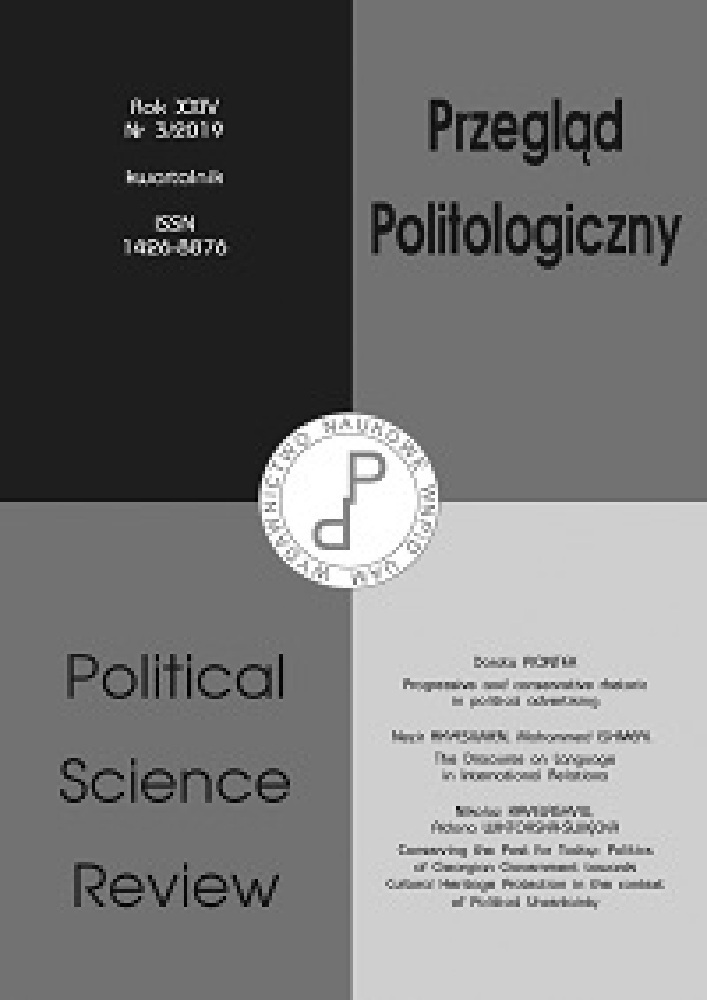Abstract
The text answers the following question: what is the point of conducting political science research? The research can make a lot of sense when you are strongly motivated and, motivation is just as important as your knowledge how to do it. In the latter case, you must proceed in the correct order. Firstly, the boundaries of the research field should be set, and secondly, original and unconventional research problems and hypotheses should be defined. Thirdly, the proper selection of primary and secondary sources is necessary. Fourthly, you choose appropriate research methods and techniques, and then construct a research tool or tools. After the determining of the level of accuracy and relevance of data collected, it is possible to proceed to the verification of hypotheses. The more thorough the process and the more inquisitive researcher, the more interesting research results are obtained.
References
Bäcker R. (2011), Nietradycyjna teoria polityki, Wydawnictwo Naukowe Uniwersytetu Mikołaja Kopernika.
Bäcker R., Wincławska M., Rak J., Czechowska L., Gadomska G., Gajda J., Gawron-Tabor K. et al. (2016), Metodologia badań politologicznych, online.
Iskhod k Vostoku I. (1921), Predchuvstviia i sversheniia. Utverzhdenia evraziitsev (Exit to the East, Anticipations and Fulfilments, The Eurasians’ Assertion)(Sofia, 1921), (Исход К ВОСТОКУ. Предчувствия и свершения. Утверждение евразийцев. София, 1921, 95).
Johnson J. B., Reynolds H. T., Mycoff J. D. (2019), Political science research methods, Cq Press.
Krauz-Mozer B. (2005), Teoria polityki: Założenia metodologiczne, PWN.
Krippendorff K. (2018), Content analysis: An introduction to its methodology, Sage publications.
Krok E. (2015), Budowa kwestionariusza ankietowego a wyniki badań, „Zeszyty Naukowe. Studia Informatica”, Uniwersytet Szczeciński.
Nowak S. (1985), Metodologia badań społecznych, Państwowe Wydawnictwo Naukowe.
Nowicka E. (1972), Bunt i ucieczka: zderzenie kultur i ruchy społeczne, Państwowe Wydawnictwo Naukowe.
Patten M. L. (2016), Questionnaire research: A practical guide, Routledge.
Rak J., Bäcker R. (2015), Problem badawczy, „Politeja” (36), pp. 155–164.
Rak J. (2017), How to measure political gnosis? Empirical evidence from Putin’s Russia, “Przegląd Politologiczny”, (4), pp. 159–171.
Rak J. (2018), Theorizing Cultures of Political Violence in Times of Austerity: Studying Social Movements in Comparative Perspective, Routledge.
Skoczylas Ł., Brzezińska A. W., Fabiszak M. (2016), Zastosowanie wywiadów fokusowych w badaniach nad pamięcią zbiorową, „Przegląd Socjologii Jakościowej” 12(4), pp. 56–77.
Szewczak W. (2010), Jak zmierzyć demokrację? Teoretyczne i metodologiczne podstawy budowy skal demokracji politycznej w politologii porównawczej, „Przegląd Politologiczny” (4).
Sztumski J. (2005), Wstęp do metod i technik badań społecznych, “Śląsk”, Katowice.
Wałęsa L. (1989), Droga nadziei, Wydawnictwo Znak.

